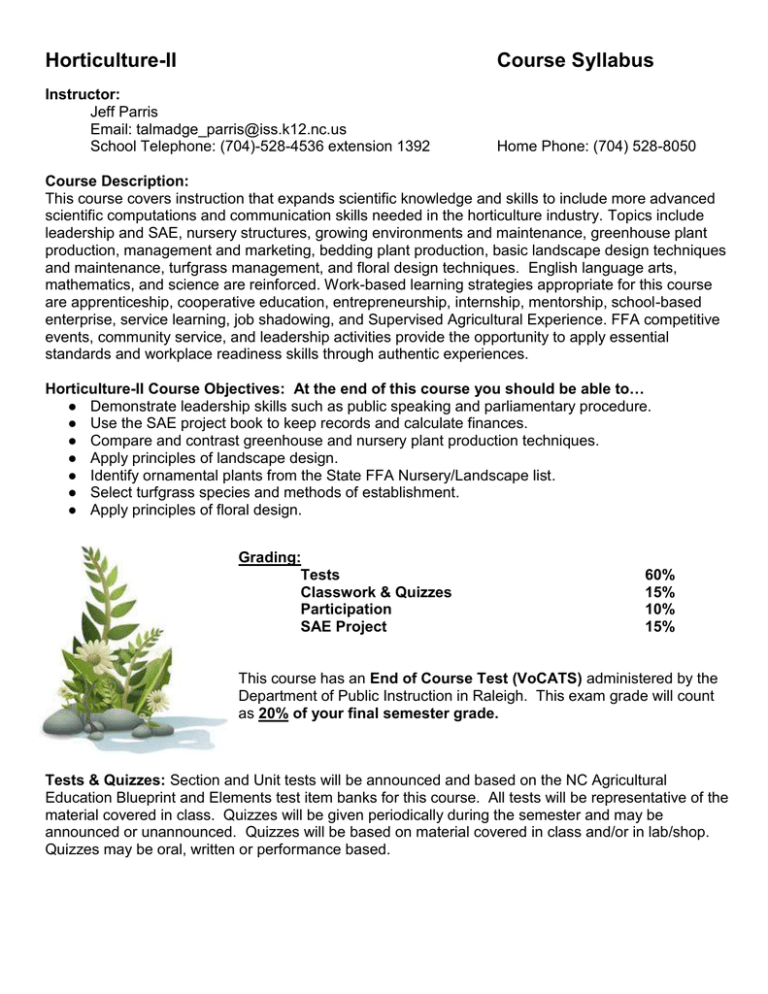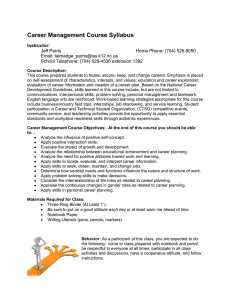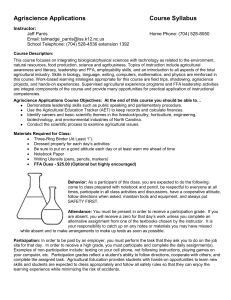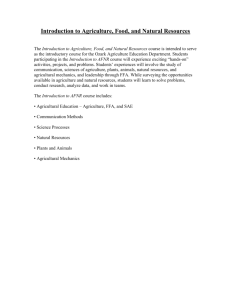Horticulture-II Course Syllabus
advertisement

Horticulture-II Course Syllabus Instructor: Jeff Parris Email: talmadge_parris@iss.k12.nc.us School Telephone: (704)-528-4536 extension 1392 Home Phone: (704) 528-8050 Course Description: This course covers instruction that expands scientific knowledge and skills to include more advanced scientific computations and communication skills needed in the horticulture industry. Topics include leadership and SAE, nursery structures, growing environments and maintenance, greenhouse plant production, management and marketing, bedding plant production, basic landscape design techniques and maintenance, turfgrass management, and floral design techniques. English language arts, mathematics, and science are reinforced. Work-based learning strategies appropriate for this course are apprenticeship, cooperative education, entrepreneurship, internship, mentorship, school-based enterprise, service learning, job shadowing, and Supervised Agricultural Experience. FFA competitive events, community service, and leadership activities provide the opportunity to apply essential standards and workplace readiness skills through authentic experiences. Horticulture-II Course Objectives: At the end of this course you should be able to… ● Demonstrate leadership skills such as public speaking and parliamentary procedure. ● Use the SAE project book to keep records and calculate finances. ● Compare and contrast greenhouse and nursery plant production techniques. ● Apply principles of landscape design. ● Identify ornamental plants from the State FFA Nursery/Landscape list. ● Select turfgrass species and methods of establishment. ● Apply principles of floral design. Grading: Tests Classwork & Quizzes Participation SAE Project 60% 15% 10% 15% This course has an End of Course Test (VoCATS) administered by the Department of Public Instruction in Raleigh. This exam grade will count as 20% of your final semester grade. Tests & Quizzes: Section and Unit tests will be announced and based on the NC Agricultural Education Blueprint and Elements test item banks for this course. All tests will be representative of the material covered in class. Quizzes will be given periodically during the semester and may be announced or unannounced. Quizzes will be based on material covered in class and/or in lab/shop. Quizzes may be oral, written or performance based. Participation/Attendance: You must be here in order to receive a participation grade. If you are absent, you will receive a zero for that day’s participation grade unless you complete an alternative assignment for homework. All tests missed while absent must be made up in a timely manner. You are responsible for all material given on any missed day for any future tests, quizzes, notebook grades or projects. Students who miss more than 6 days of class will not receive credit for the course until they have made up their excessive days. Materials Required for Class: Three-Ring Binder (At Least 1”). Notebook Paper Writing Utensils (pens, pencils, markers) FFA Dues - $25.00 (Optional but highly encouraged) Notebook: A 3-ring binder notebook with loose-leaf paper is required for this class. Any material given in class should be recorded and/or placed in your notebook in a neat and orderly manner. It is important for you to take adequate notes. You may write in pencil or ink. Notebook checks may be announced or unannounced. Student Organization (FFA): FFA is an integral part of a complete agricultural education program and helps students develop leadership skills, prepare for careers, and grow into more competent, responsible citizens. All students enrolled in agricultural education are highly encouraged to join their local FFA chapter and participate in its activities. Bathroom Policy: You will be given 4 bathroom passes for each 9-week grading period which can be used as needed once signed by Mr. Parris. Conserve your passes so that you have one available in case of an emergency. If you still have them at the end of the grading period, you will be given extra credit on your participation grade. Textbooks: All agricultural students have access to a classroom set of textbooks, but we do not have enough copies to issue each student a book. Therefore, it is essential that you use your time wisely to complete assignments and exercises during class since these books cannot be taken from class without permission.



